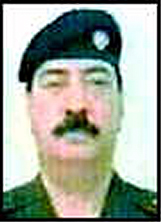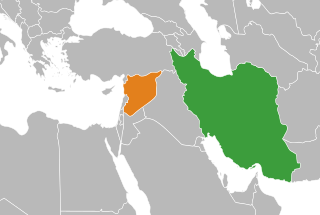Iraq is a federal parliamentary representative democratic republic. It is a multi-party system whereby the executive power is exercised by the Prime Minister of the Council of Ministers as the head of government, the President of Iraq as the head of state, and legislative power is vested in the Council of Representatives.

The Islamic Supreme Council of Iraq is a Shia Islamist political party in Iraq. It was established in Iran in 1982 by Mohammed Baqir al-Hakim and changed its name to the current Islamic Supreme Council of Iraq in 2007. Its political support comes from Iraq's Shia Muslim community.

Ibrahim Abd al-Karim al-Eshaiker, also known as Ibrahim al-Jaafari, is an Iraqi politician who was Prime Minister of Iraq in the Iraqi Transitional Government from 2005 to 2006, following the January 2005 election. He served as Minister of Foreign Affairs from 2014 to 2018.

The Islamic Dawa Party, also known as the Islamic Call Party, is a Shia Islamist political party in Iraq. Dawa and the Supreme Islamic Iraqi Council are two of the main parties in the religious-Shiite United Iraqi Alliance, which won a plurality of seats in both the provisional January 2005 Iraqi election and the longer-term December 2005 election. The party is led by Haider al-Abadi, who was the Prime Minister of Iraq from 8 September 2014 to 25 October 2018. The party backed the Iranian Revolution and also Ayatollah Ruhollah Khomeini during the Iran–Iraq War and the group still receives financial support from Tehran despite ideological differences with the Islamic Republic. As of 2019, after two decades of political prominence and success, it is suffering from internal divisions and on danger of losing its "political relevance".

Ayatollah Abdul Aziz al-Hakim was an Iraqi theologian and politician and the leader of Islamic Supreme Council of Iraq, a party that has approximately 5% support in the Iraqi Council of Representatives. He also served as the President of the Governing Council of Iraq

The National Iraqi Alliance, also known as the Watani List, is an Iraqi electoral coalition that contested the 2010 Iraqi legislative election. The Alliance is mainly composed of Shi'a Islamist parties. The alliance was created by the Supreme Council for Islamic Revolution in Iraq to contest in the January 2005 and December 2005 under the name United Iraqi Alliance, when it included all Iraq's major Shi'a parties. The United Iraqi Alliance won both those of elections however later fell apart after several major parties left the alliance due to disputes with Prime Minister Nouri al-Maliki and the Supreme Council.

Parliamentary elections were held in Iraq on 30 January 2005 to elect the new National Assembly, alongside governorate elections and a parliamentary election in Kurdistan Region. The 275-member legislature had been created under the Transitional Law during the international occupation. The newly elected body was given a mandate to write a new constitution and exercise legislative functions until the new constitution came into effect. The elections also led to the formation of the Iraqi Transitional Government.

Parliamentary elections were held in Iraq on 15 December 2005, following the approval of a new constitution in a referendum of 15 October.
The first Shia theocracy in the 20th century was established in Iran following the Iranian Revolution that led to the fall of the Shah of Iran. The constitutional name of Iran was established as the Islamic Republic of Iran. Islam is the state religion of the country.

Mohammed Younis al-Ahmed al-Muwali aka Khadr al-Sabahi is a former senior member of the Iraqi Ba'ath Party. Ahmed currently has a million dollar bounty placed on his head as one of Iraq's most wanted men accused of funding and leading resistance operations. He is the leader of al-Awda; an underground Ba'athist movement in Iraq.
Sheikh Jalal al-Din Ali al-Sagheer is an Iraqi politician and a former member of parliament in the Islamic Supreme Council of Iraq. Prior to the 2003 US-led Invasion of Iraq he was the chairman of the Paris Mosque in France. He is the imam of the Shi'a Buratha Mosque in Baghdad.

Governorate or provincial elections were held in Iraq on 31 January 2009, to replace the local councils in fourteen of the eighteen governorates of Iraq that were elected in the 2005 Iraqi governorate elections. 14,431 candidates, including 3,912 women, contested 440 seats. The candidates came from over 400 parties, 75% of which were newly formed.

The Republican Party of Georgia, commonly known as the Republicans, is a political party in Georgia active since 1978. Until March 2016, the party was a part of the Georgian Dream coalition that won the 2012 election, defeating the United National Movement. Currently it is in opposition to Georgian Dream as part of the UNM-led Strength Is in Unity coalition.
List of the Martyr al-Mehraab and the Independent Forces,, commonly known as the al-Mehraab Martyr List was a Shi'a Islamist, Iraqi political coalition formed for the 2009 Iraqi governorate elections by the Islamic Supreme Council of Iraq.
Abu Mustafa al-Sheibani also known as Hamid Thajil Warij al-Attabi or Hamid al-Sheibani is an Iraqi Shi'a leader who commands his own insurgent group and smuggling network known as the Sheibani Network, which became one of the Iraqi Special Groups. An arrest warrant was issued for him by the Central Criminal Court of Iraq on 12 April 2005 with a reward of $200,000 for information leading to his capture. In 2006 he was added to the Iraqi Government's 41 Most-Wanted list. He holds both Iraqi and Iranian nationality because he lived in exile in Iran during Saddam Hussein's rule later returned there to live in Tehran after 2006. In September 2010, after Iraqi Prime Minister Nouri al-Maliki formed a coalition government with Shi'a rebel leader Muqtada al-Sadr, Sheibani was allowed to return to Iraq along with Abu Deraa.
This article concerns the formation process of the Al Maliki I Government of Iraq in the aftermath of the Iraq National Assembly being elected on December 15, 2005. Due to disputes over alleged vote-rigging the results of the election were only certified by the Independent Electoral Commission of Iraq on February 10, 2006.
In the aftermath of the 2010 election, great attention was given to the decision on who should be the next Iraqi PM. Both al-Iraqiyya's Allawi and the State of Law coalition's al-Maliki laid claim to the post, so it was seen as up to the Kurdish parties and the Iraqi National Alliance to decide this matter.

Syria and Iran are strategic allies. Syria is usually called Iran's "closest ally", with ideological conflict between the Arab nationalism ideology of Syria's secular ruling Ba'ath Party and the Islamic Republic of Iran's pan-Islamist policy notwithstanding. Iran and Syria have had a strategic alliance ever since the Iran–Iraq War, when Syria sided with non-Arab Iran against neighbouring Ba'ath-ruled Iraq. The two countries shared a common animosity towards then Iraqi president Saddam Hussein and coordination against the United States and Israel.

The term Axis of Resistance refers to an anti-Western, anti-Israeli, and anti-Saudi political and informal military alliance between Iran, militant groups in Palestine, the Syrian Government, and the Lebanese militant group Hezbollah. Pro-Syrian Ba'athist militias, Iraqi Shia militias that are part of the Iraqi Government-sanctioned Popular Mobilization Forces, and the Yemeni Houthi movement are also considered part of the alliance.

The family of al-Modarresi, also transliterated in a number of other ways, including al-Moderrissi or al-Mudarrisi are an Iraqi-Iranian Shia clerical family that settled in Najaf, then Karbala, from Mashhad, in the early 20th century. The family claims agnatic descent from Muhammad's daughter Fatimah, through her great-grandson, Zayd, carrying the honorific title of Sayyid.











